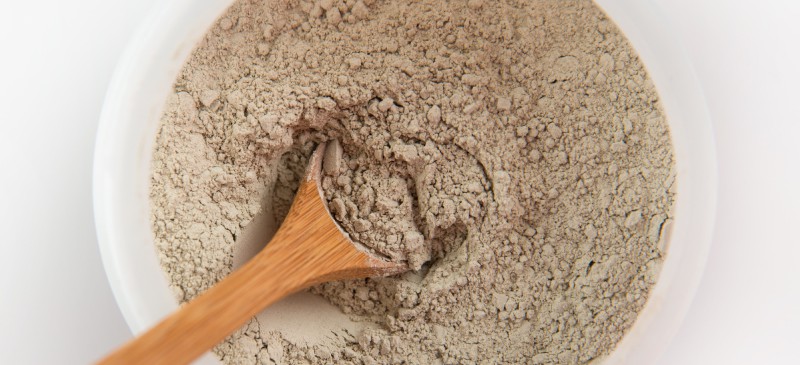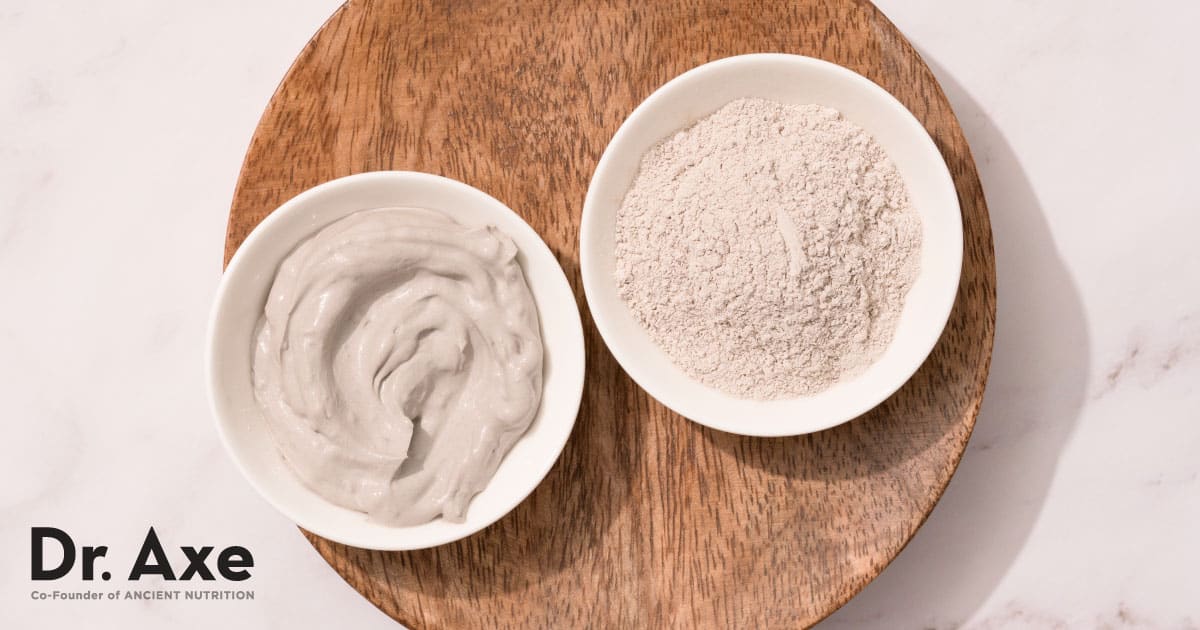12 Bentonite Clay Benefits — for the Skin, Gut and More
By
Dr. Josh Axe, DC, DNM, CN
September 4, 2019
Dr. Axe on Facebook99 Dr. Axe on Twitter19 Dr. Axe on Pintrest258 Share on Email
Print Article
While bentonite clay has been used for centuries around the world to promote better health and ward off diseases, those living in the U.S. and Europe have, for the most part, only recently become familiar with this product.
What is bentonite clay used for? Bentonite clay (BC), also called calcium bentonite clay or
Montmorillonite clay, is now taking off as a wellness trend among people who are looking to help naturally improve their skin’s health, detoxify their bodies and improve digestion.
Individuals in various cultures refer to BC as “healing clay,” since it cleanses various parts of the body. It’s possible to enjoy bentonite clay benefits by taking it internally (in other words, drinking and eating it), on top of using it externally on your skin and hair.
What Is Bentonite Clay?
Bentonite clay is a product composed of ash taken from volcanoes. The clay is dried in the sun, filtered and then sold commercially in several forms, including as facial clay masks, ointments/pastes, and hair treatments.
When mixed with water it forms a thick paste.
Technically BC is an absorbent
aluminium phyllosilicate clay. The largest known source of BC is found in Fort Benton, Montana, where numerous volcanoes are present.
The name of the clay stems from the town where today much of the supply is still harvested.
The other name that bentonite clay is typically given, Montmorillonite clay, stems from the region of France called Montmorillon, where the clay was first discovered.
Today the clay is harvested mostly in the U.S., France and Italy. “Bentonite” is actually the trade name that the clay has been given, but people for the most part speak about Montmorillonite and Bentonite clay interchangeably and are referring to the same product.
Bentonite clay stems back far in history as a traditional healing method for protecting the body from disease. It has been reported that several traditional cultures living in regions of the Andes, Central Africa and Australia have applied and consumed volcanic clays in numerous ways for centuries.
Because the clay is readily available and required no modern processing, it’s easy to see why it’s been a popular and cost-effective way of “detoxing” the body for quite some time.
What are the benefits of bentonite clay? As explained more below, these include:
- Healing skin conditions
- Aiding in detoxification processes
- Protecting against bacterial infections
- Supporting digestive and respiratory processes
- Aiding in dental health
- Supplying nutrients
- Potentially helping with weight loss
- and more
How It Works
Bentonite clay benefits your body in several key ways:
- It helps to expel toxins and heavy metals.
- It has antibacterial properties and fights off various pathogens responsible for disease, such as E. coli and the virus that causes staph infection.
- It contains a range of nutrients. Bentonite clay is known to have an abundance of minerals, including calcium, magnesium, silica, sodium, copper, iron and potassium.
- It nourishes skin/hair by balancing oil production, removing dead skin cells, clearing clogged pores, and fighting bacteria.
BC can help to reduce the negative effects of toxins that we encounter everyday, such as those given off from paint, cleaning supplies, markers, substances used in building homes, low-quality unpurified water, and even pesticides.
- BC essentially “seeks” toxins in the body to bind with due to its chemical composition. Then it acts like a magnet and sponge, absorbing harmful substances so they can be removed from the body.
- While in its natural state, bentonite clay has negatively charged molecules. Most toxins and heavy metals have positively charged molecules. This allows the two to bind together easily and stay united while the toxin removal process happens.
- “Heavy metal toxins” usually refer to substances like mercury, cadmium, lead and benzene. Upon binding, BC is able to help remove meats, toxins, chemicals and impurities from the gut, skin and mouth. Additionally, it’s used to reduce the presence of toxins in the food supply and animal feed.
Some people also choose to use BC as a supplement, since the clay is a natural source of important dietary nutrients. When ingested into the body, either in a drink form or by eating the clay, its vitamins and minerals are absorbed similarly to how a supplement would be.
Calcium Bentonite vs. Sodium Bentonite
There are two types of bentonite clays. While calcium bentonite is used on the body, both internally and topically, sodium bentonite has more industrial uses.
Sodium bentonite clay is used as a
natural sealant, such as to seal roads, lagoons, landfills and ponds. It has natural swelling abilities, swelling 15–18 times its dry size when combined with water, making it an effective “hole plug.”
It’s also low-cost and environmentally safe because it contains no chemicals, additives or toxins. It’s commonly
mined in the state of Wyoming.
Both types of bentonites contain a percentage of other minerals, as well as sand and silt that is filtered out. But because calcium bentonite is a non-swelling bentonite, it doesn’t serve the same purposes for industrial uses.
Related: How to Use a Konjac Sponge (+ the Benefits for Skin)
Top 12 Benefits and Uses
1. Supports Skin Health (Treating Oiliness, Poison Ivy, Dermatitis and Wounds)
Benefits of bentonite clay for skin include:
When combined with water and left to dry on the skin as a clay mask, BC is able to bind to bacteria and toxins. It can help to remove these substances from the surface of the skin and within pores, helping to reduce breakouts.
Thanks to the clay’s special ability to act as an
antibiotic treatment when applied topically, BC can also help to calm skin infections, like diaper rash and contact dermatitis.
Topical application of bentonite clay has even been shown to help
heal Buruli ulcers, which is a “flesh-eating” infection resulting from
Mycobacterium ulcerans bacteria generally seen in third-world countries.
2. Aids in Digestion
By removing toxins, digestive-distress causing chemicals and heavy metals from the gut, bentonite clay helps to promote digestion.
Research has also shown that, in animals, bentonite clay can bind to particular toxins like “
aflatoxins” that are common in the standard diet, found usually on improperly stored food products.
When left unattended, an influx of aflatoxins can
contribute to liver damage and potentially even the onset of certain cancers.
In
one study using cows, scientists found that bentonite clay molecules
bound to bovine rotavirus and bovine coronavirus, two major viruses that contribute to gastroenteritis (referred to as stomach flu in people). Variations of both of these viruses can also be present in human beings.
Thanks to its ability to neutralize bacteria in the gut and kill viruses, BC helps to alleviate many digestive problems. Some people use bentonite clay as relief for nausea and vomiting (including pregnant women), constipation, and to help with IBS.
It’s possible that the reason people find relief in these situations has to do with the way bentonite protects the lining of your intestines from letting toxins through, which would otherwise contribute to leaky gut. So far, this effect has only
been observed in animals, but may also apply in human subjects.
BC may benefit your pets as well. It is
safe for pet consumption within your own home and can alleviate pet’s nausea and vomiting in the same way.
3. May Promote Weight Loss
As part of a healthy diet containing plenty of
alkaline foods, natural detox drinks and
probiotics/prebiotics, bentonite clay has been found in
certain studies to contribute to weight loss in healthy men over a 21-day period. The participants, overall, also saw improvement in total cholesterol.
Because of the uncontrolled nature of this study, it is not possible to determine how influential bentonite clay, as a single element, was on the observed weight loss, so these results should be approached with caution. To date, no controlled, human studies exist to reflect this benefit.
However, a
2016 trial in rats tested the impact of BC on weight loss and found that the supplement was correlated with weight loss, as well as decreased cholesterol.
4. Helps with Thyroid Function
In
mice studies, BC has been found to absorb certain thyroid hormones (T3 and T4), resulting in the alleviation of hyperthyroidism. This result suggests bentonite might potentially help people keep thyroid levels down, although the test has not been duplicated in humans as of yet.
5. Stops Growth of Two Cancer Cell Lines in a Lab
A
lab study conducted in 2016 discovered that bentonite clay stopped the growth of cancer cell line U251, a human cancer cell found in a central nervous cancer called glioblastoma. However, another cell line was grown larger when exposed to the substance.
The researchers explained that the cell formations and swelling of bentonite clay is the reason for this, and that it could potentially be effective against specific types of cancers (like glioblastomas), but not others.
Another
lab experiment observed bentonite clay caused cell death of
Caco-2 cells, a colorectal cancer line. In this study, the clay exhibited a large amount of oxidative stress upon just the cancer cells without damaging the DNA.
6. Boosts Immunity by Killing Harmful Bacteria and Viruses
BC has been found to be effective at killing harmful bacteria. In a study published by the
Journal of Antimicrobial Chemotherapy, “results indicate that specific mineral products have intrinsic, heat-stable antibacterial properties, which could provide an inexpensive treatment against numerous human bacterial infections.”
More research is still needed on the topic, but results of studies so far appear to be promising in terms of how the clay can be used as a treatment for these gut-related illnesses. On top of killing these types of infections and viruses, bentonite clay benefits your immune system by keeping the gut wall strong.
Much of the immune system actually lives inside of the gut microbiome, and when the gut wall is compromised, toxins are better able to leach into the bloodstream and cause serious problems. By protecting the gut wall and decreasing the amount of pesticides, toxins, bacteria and chemicals that could potentially enter the blood, the body is better able to protect itself.
This natural product is composed of ash taken from volcanoes. It's used to treat many different conditions affecting the skin to the digestive system.

draxe.com







